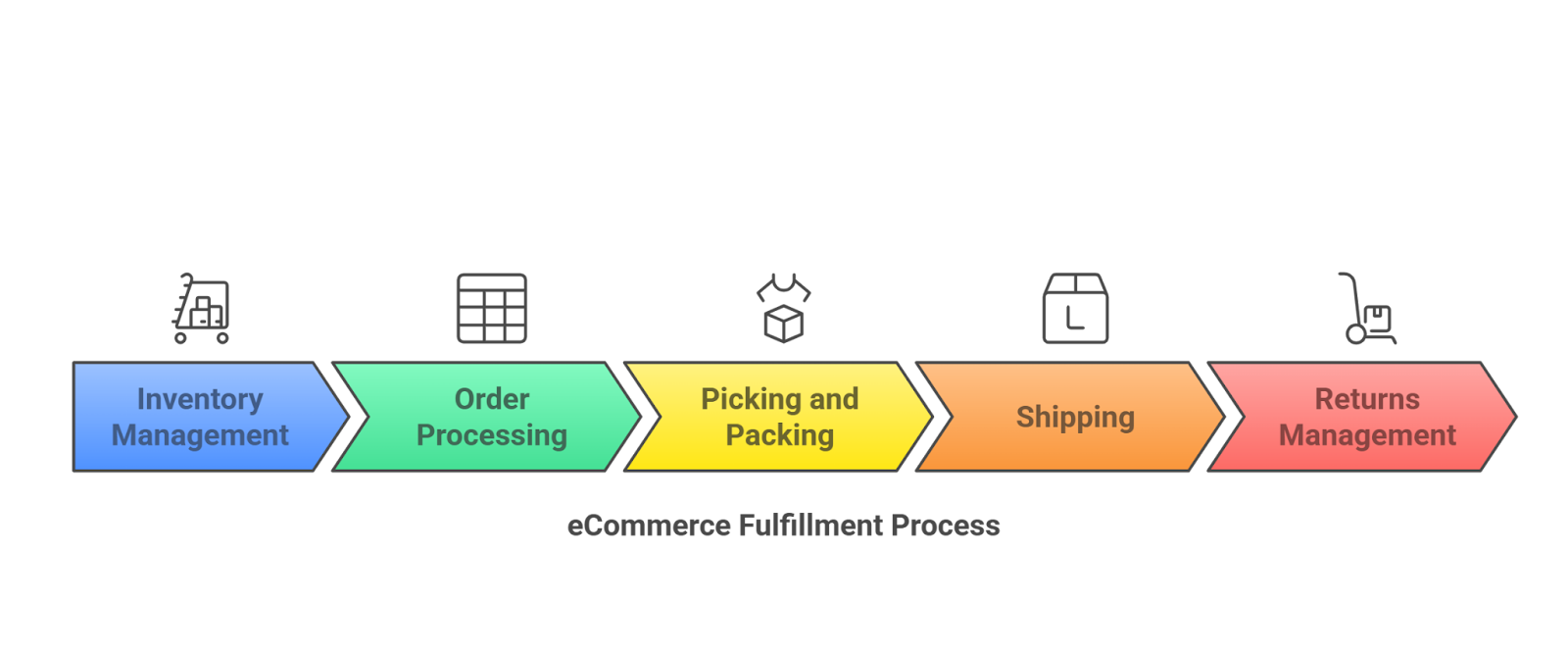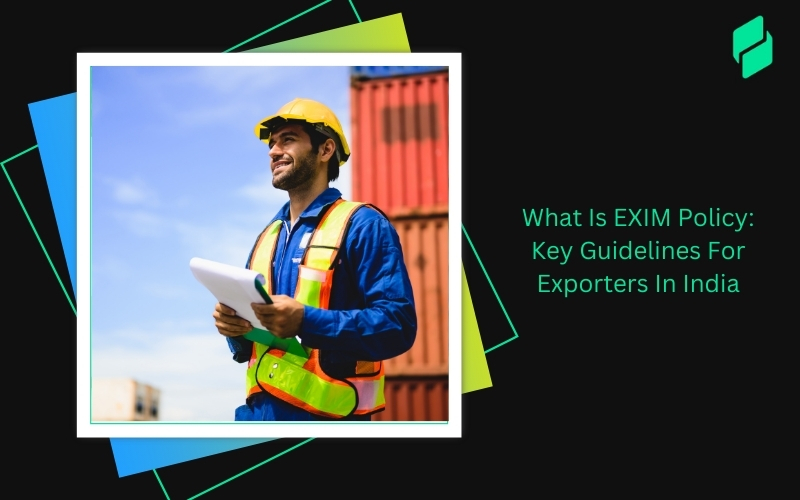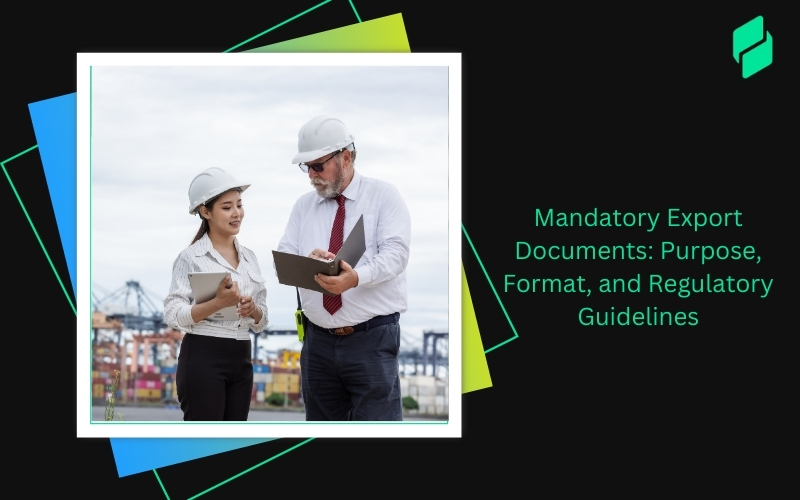Optimize your business: use unlimited savings with Pazago fulfilled now!
Get Started ->Did you know that e-commerce exports from India are estimated to be around US $5 billion, which represents just 1.1% of the country’s total merchandise exports? While this may seem like a small fraction, the opportunity is enormous. India’s e-commerce export market is growing rapidly, and this is just the beginning.
For exporters in India, the key to tapping into the full potential of this market lies in a crucial element: fulfillment. How you manage inventory, handle orders, ship products, and deal with returns can make all the difference in whether your business grows or struggles in international markets.
In this blog, we’ll explore the ins and outs of e-commerce fulfillment, from understanding the process to choosing the right fulfillment model for your export business. Let’s get started on how you can take your exports to the next level!
What is E-commerce Fulfillment?

E-commerce fulfillment covers everything from receiving and storing products to packing and shipping them to customers once they order online. It’s critical to running a successful online business because it directly impacts delivery speed, customer satisfaction, and profitability.
Now that you understand what eCommerce fulfillment is, let's break down how the entire process works step by step.
Also Read: Top Multi-Carrier Shipping Options For E-Commerce Companies In India
The E-Commerce Fulfillment Process: How It Works

To better understand how e-commerce fulfillment works, let’s break down the key steps involved. As an exporter, it's essential to be familiar with each stage to ensure your international shipments run smoothly.
- Inventory Management
Before you can ship an order, you need to control your inventory. This involves keeping track of your stock, where it's stored, and how it's organized. Proper inventory management is essential to ensuring your products are always available when customers need them, and it helps prevent problems like overselling or running out of stock.
A well-managed inventory system allows you to monitor sales trends, forecast demand, and avoid storage costs for excess stock.
- Order Processing
The fulfillment process starts as soon as an order is placed. The first step is order processing, where the system verifies the payment and checks the stock levels. The order is confirmed and moved to the next stage if everything's in place.
Order processing includes verifying customer details, preparing invoices, and ensuring all necessary documents for international shipments (like invoices and packing slips) are ready. Regarding international exports, it's important to include relevant customs documentation to avoid border delays.
- Picking and Packing
This is the hands-on part of the process. Picking is when the ordered products are selected from your inventory, while packing is when they’re secured for shipping. A reliable packing system ensures your products are securely packed, minimizing the chances of damage or returns during shipping.
Packing should also be efficient, using the right materials to minimize waste while maintaining the product's safety. Sometimes, you might also want to personalize packaging with your brand’s logo or a thank-you note, which can enhance the customer experience.
- Shipping
Once the product is packed, it’s time to ship it. Shipping involves selecting the appropriate carrier, paying for the shipment, and arranging for delivery. When exporting internationally, it's essential to choose reliable couriers with global reach and the ability to navigate customs requirements smoothly.
Speed is a key factor in shipping. Many international customers expect fast, affordable delivery options, and you should aim to meet or exceed these expectations whenever possible.
Simplify Your Shipping with Pazago! Get access to trusted carriers, real-time tracking, and seamless customs handling, all in one place. Start shipping smarter today.
- Returns Management
Returns are a natural part of e-commerce, especially when selling internationally. Providing an easy returns process builds customer trust and makes them more likely to shop with you again. A clear returns policy, easy-to-follow instructions, and a system for restocking returned items will help you stay organized.
Managing returns efficiently is essential to maintaining customer satisfaction and minimizing costs, as you’ll need to account for return shipping, restocking fees, and any potential damage during transit.
With the process outlined, let’s explore the different fulfillment models that can work best for Indian exporters.
Also Read: Top Multi-Carrier Shipping Options For E-Commerce Companies In India
E-Commerce Fulfillment Models for Indian Exporters

Choosing the right fulfillment model is crucial for smooth operations and customer satisfaction. Here are the most common models to consider:
- Self-Fulfillment
Self-fulfillment means managing all fulfillment tasks yourself. You handle inventory, packing, shipping, and returns. This model gives you control, but as your business grows, it can be time-consuming and complex, especially when managing international orders. You also need to deal with shipping regulations, customs, and global logistics.
- Third-Party Logistics (3PL)
With a 3PL, you outsource fulfillment to a logistics provider. They manage storage, picking, packing, and shipping. 3PLs are beneficial for Indian exporters, offering global shipping expertise and a network to handle international deliveries. They save you time, reduce overhead, and help scale your business quickly. However, choosing the right 3PL is critical to avoid service issues and high costs.
- Dropshipping
In dropshipping, you don’t hold any inventory. When an order is placed, a third-party supplier ships the product directly to the customer. While this reduces upfront costs and storage needs, you lose control over product quality, shipping speed, and customer service. International shipping and customs can also be problematic, as you rely on the supplier’s ability to deliver on time.
- Partnering with Indian Freight Forwarders
Freight forwarders specialize in international shipping. They handle the logistics, customs clearance, and delivery of your products. Freight forwarders are ideal for managing the complexities of global shipping, especially for large or bulk shipments. They help ensure timely delivery and compliance with international regulations. However, like 3PLs, selecting the right partner is essential to avoid delays and hidden costs.
Don’t let fulfillment challenges slow down your export growth. Pazago helps Indian exporters manage inventory, track shipments, and simplify cross-border logistics, all from one platform.
After exploring fulfillment models, let’s see how omnichannel fulfillment can boost your strategy even further.
Also Read: Exploring 3PL Services with Pazago: Enhance Your Logistics
Maximizing Efficiency with Omnichannel Fulfillment

Omnichannel fulfillment allows you to deliver a seamless customer experience across multiple sales channels, whether it's your website, marketplaces like Amazon, or social media platforms. For businesses aiming to grow and maintain reliable service, especially exporters, this is crucial.
- Unified Inventory
Omnichannel fulfillment ensures that your inventory is centrally managed, so whether a customer buys from your website or a marketplace, they receive the same stock availability information.
- Flexible Shipping Options
Customers today expect multiple shipping options, from express delivery to free standard shipping. Omnichannel fulfillment gives you the flexibility to offer these choices across different platforms, streamlining the shipping process and improving customer satisfaction.
- Order Fulfillment Across Channels
With omnichannel fulfillment, you can fulfill orders from any channel using the same warehouse or fulfillment center. For international orders, this ensures that your customers receive products in a timely manner, regardless of where they bought them.
- Improved Customer Experience
By integrating all your sales channels and fulfillment processes, you can deliver a consistent experience for your customers. This leads to higher satisfaction, repeat purchases, and a stronger brand presence.
Now that we’ve explored omnichannel fulfillment, let’s break down the costs associated with e-commerce fulfillment.
Also Read: Supply Chain, Freight Shipping and Home Logistics Solutions
Understanding the Costs of E-Commerce Fulfillment

Understanding the costs involved in e-commerce fulfillment is essential for managing your margins and pricing strategy. Here's a breakdown of the key expenses:
- Warehousing Costs
If you’re using a 3PL or dropshipping, warehousing costs can vary depending on storage space, the type of products, and the region. Fees typically depend on the size and weight of your inventory, and some partners may add extra charges for storing items long-term.
- Picking & Packing
Picking and packing fees are charged when an order is processed. This cost depends on how complex the picking process is and the materials used for packaging. You can reduce these costs by optimizing your inventory layout and choosing cost-effective packing materials.
- Shipping Costs
Shipping is one of the biggest costs in international fulfillment. Shipping charges vary based on the product's weight, how fast you need it delivered, and the destination. Using a fulfillment partner with access to global shipping networks may help reduce these costs.
- Return Costs
Handling returns is another cost to consider. While returns can’t always be avoided, having a clear returns policy can help manage expenses. Some fulfillment partners offer reverse logistics services that handle returns more efficiently.
- Technology and Management Fees
Most fulfillment services charge for their technology platform, which might include order management, tracking, and inventory systems. Be sure to factor in these fees when choosing a fulfillment partner.
With fulfillment costs in mind, the next step is selecting a fulfillment partner who can help you manage those expenses effectively.
Also Read: Guide to Various Types of Freight and Shipping Charges
Choosing the Right E-Commerce Fulfillment Partner

Selecting the right e-commerce fulfillment partner is crucial for meeting customer expectations and scaling your business. Here are the key factors to consider:
- Shipping Expertise: Your fulfillment partner should have experience with international shipping and customs, especially when exporting from India. They need to know the ins and outs of global regulations and delivery requirements.
- Technology Integration: A good partner will offer systems that integrate with your eCommerce platform, allowing for real-time tracking, inventory updates, and streamlined order processing.
- Scalability: As your business expands, your fulfillment requirements will evolve. Ensure your partner can scale with you, whether it’s handling more orders or expanding to new markets.
- Cost: Compare costs between different partners, including storage, handling, and shipping fees. The right partner should offer a balance between affordability and service quality.
After considering the factors involved in selecting a partner, let's look at why Indian exporters turn to Pazago for smooth fulfillment.
Also Read: Top 10 Logistics Solutions Providers In India At Best Terms
Why Indian Exporters Choose Pazago for Seamless E-Commerce Fulfillment

Pazago offers a comprehensive platform designed to optimize e-commerce fulfillment for Indian exporters. Here’s how it enhances your operations:
- Affordable Logistics Solutions: Pazago connects you with trusted carriers, offering cost-effective shipping options that help reduce transportation expenses without compromising reliability.
- Track Shipments in Real-Time: Monitor your shipments across 180+ carriers with Pazago’s real-time tracking. Stay updated on your cargo’s journey to avoid delays and unexpected fees.
- Flexible Financing: Pazago provides easy access to collateral-free credit with attractive interest rates, helping you maintain a smooth cash flow and prevent any costly disruptions during the fulfillment process.
- Centralized Communication Hub: Simplify coordination with suppliers, freight providers, and your internal teams in one platform. Pazago minimizes errors and enhances communication across all parties.
- Secure Document Management: Easily store and access important trade documents in a safe environment, reducing the risk of administrative delays and ensuring smooth international shipments.
- Simplified International Payments: Secure, efficient cross-border transactions and optimize currency exchange rates, saving time and money on international payments.
- Pre-Shipment Quality Control: Pazago offers pre-shipment inspections to ensure your products meet quality standards before they are shipped, helping you avoid defective goods and financial losses.
Pazago’s suite of services streamlines the fulfillment process for Indian exporters, cutting costs, improving efficiency, and ensuring smooth international trade operations.
Conclusion
In today’s competitive global market, efficient and cost-effective fulfillment is key to staying ahead. Pazago offers Indian exporters a powerful platform to streamline every aspect of their fulfillment process, from shipping and tracking to financing and quality control. With its user-friendly tools and services, Pazago helps you reduce costs, improve communication, and ensure timely deliveries, making it easier to scale your international business.
Ready to simplify your fulfillment process? Book a demo now and discover how Pazago can help you take your eCommerce business to the next level.


.png)








